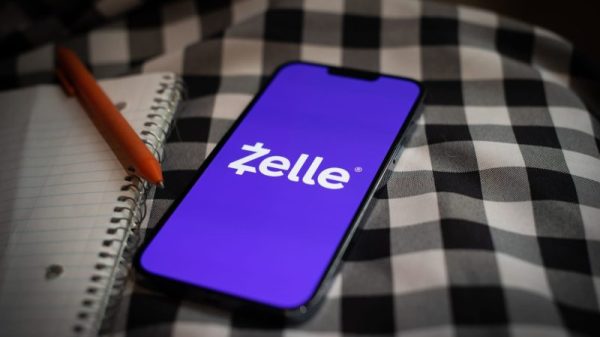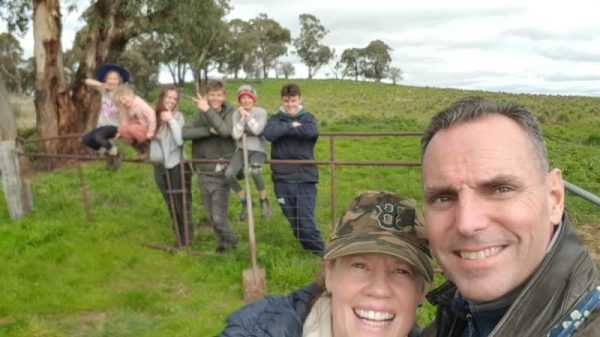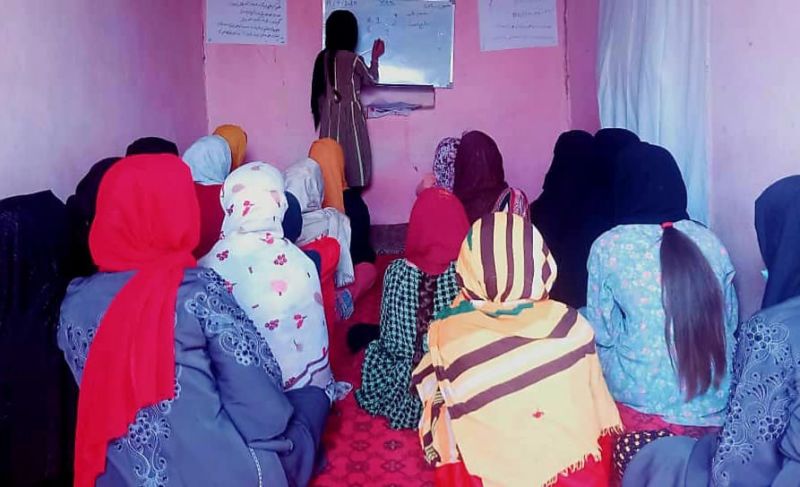Khawar was preparing to start medical school in Afghanistan when Taliban fighters swept into the capital Kabul, seizing power and imposing the world’s only ban on educating girls over 12.
Khawar had already bought a pile of textbooks, with dreams of becoming a cardiologist. But three years on, her days start at 4 a.m. for prayers and a long list of household chores.
But during her lunch break, she pivots to something different.
For a few hours before resuming her chores, the 22-year-old studies in secret for a degree in health sciences through the University of the People, a non-profit online university based in the United States that allows refugees worldwide, and women like Khawar, to study for free.
Alongside online schools, international efforts are ramping up to educate teenage girls and women, who are all but confined to their homes by a regime that sees them as a subservient underclass.
Some lessons occur in secret locations inside Afghanistan; others are online, on phones and on television and radio. They’re run by different people, but are all designed to reach as many Afghan girls and women as possible.
For the educators, sharing knowledge is a matter of urgency – an uneducated population is much easier to manipulate than one with a secret network of women and girls with the skills and conviction to one day lead the country.
‘A hope center’
Erfanullah Abidi was among the crush of people trying to flee Afghanistan in August 2021, in a chaotic evacuation after the United States and its allies ended their 20-year occupation of the country.
A former government employee and translator and cultural advisor for NATO, he and his family flew to Australia, where he became frustrated by the failure of online campaigns to push the Taliban to reopen schools for girls.
So, he contacted friends and recruited teachers. By February 2023, they held the first of what are now around 15 regular classes in secret locations around Afghanistan.
“It’s a face-to-face class, but each student [is] representing a group of four or five other students that we think should not attend” due to security concerns, he said.
He said it’s easy to find female teachers who are out of work due to the Taliban ban on women teaching boys, but it can be difficult to recruit ones in the right place who meet strict security requirements.
If a potential security breach is detected, classes are canceled – safety is their top priority.
Abidi says the secret classes offer more than education. “This is a hope center. This is a resilience center. This is a place where they see their future, or where they shape or form their future,” he said.
“[The Taliban] keep people uneducated, especially girls, because they will become mothers in the future. They will become parents in the future. Their ideology is to keep them uneducated so they can manipulate the children of the next generation for their terrorist ideology.”
1.4 million out of school
Three years after the Taliban takeover, UNESCO estimates 1.4 million girls are being deliberately deprived of a secondary school education.
The number of primary school students is also falling, due to a shortage of male teachers. Struggling families are also opting to send their children to work instead of school.
The Begum Organization for Women (BOW) hopes to reach girls and women inside their homes, with lessons on radio, online and on TV.
Afghan entrepreneur Hamida Aman founded BOW at the end of 2020 to defend the rights of Afghan women, but it’s become so much more than that.
From Kabul, Radio Begum broadcasts six hours of radio lessons a day, along with health, psychology and spiritual programs to women across most parts of Afghanistan.
“Our radio station is not tolerated in some provinces in the south, because they are very, very conservative. They even don’t want to hear women’s voices on the radio,” said Aman.
Every day between 10 and 20 women phone in to the station to seek advice from on-air doctors and psychologists about how to cope with life in Afghanistan, Aman said.
“Mothers are calling us to complain that their daughters are not eating anymore …. They seem depressed, they don’t talk, or they keep crying.”
Begum Academy also offers lessons online filmed in its studios thousands of miles away in Paris. The televised classes cover a wider array of subjects, presented by women for women – something that’s not allowed in Afghanistan under the Taliban.
“Right now, if you switch on the television in Afghanistan, when you pass from one channel to another, you see only men, mostly men, very few women, especially on the prime time on the evening program, only men, men, men,” Aman said.
Begum TV is also working to expand its programming to provide more light entertainment. “Our audience is asking us to have some entertainment because life is so sad, the situation is so sad, and there is nothing light and joyful,” Aman said.
Lessons from Rwanda
On August 15, 2021, Shabana Basij-Rasik, founder of the School of Leadership, Afghanistan (SOLA), locked the school’s doors, burned its records and rushed her students to the airport to relocate to Rwanda.
Each year they offer a limited number of scholarships to Afghan girls to board and study, but applications far exceed available places – and they had to find a way to reach more students.
Nearly 20 years later, as the founder of the only all-girls boarding school in Afghanistan, I’m burning my students’ records not to erase them, but to protect them and their families.
2/6 pic.twitter.com/JErbZCSPuC
— Shabana Basij-Rasikh (@sbasijrasikh) August 20, 2021
An online version of the school – SOLAx – started in March, taking a revamped Afghan curriculum to around 8,000 students spread across 41 countries.
“It’s so sad, because Afghans are now everywhere,” said SOLAx co-founder Mati Amin. “But the majority (89%) still come from inside Afghanistan, from all 34 provinces.”
Thirty-minute lessons are delivered in English, Pashto and Dari via WhatsApp, with the support of tech company Meta, which is allowing SOLAx to use its application programming interface (API) for free.
“WhatsApp is the best way to reach these girls. And we see the traction when we get students coming back, requesting up to over 1,000 lessons in recent days,” said Amin.
Work is underway to add the full Afghan curriculum for grades 7 to 12, with some modifications to encourage critical thinking and to sustain the interest of the social media generation.
“There are educated Afghan women teaching English,” he said. “And I think that’s super important. That’s another way of giving them that hope that someday they could also be in this position.”
Khawar doesn’t speak to her old school friends anymore. All of them have left Afghanistan, some of them before the Taliban takeover to take up offers at universities elsewhere.
After they graduated from high school, five of her fellow students left to study medicine in Turkey. Her school principal had implored her to go with them, but she refused, preferring to attend Kabul University, like her relatives.
“Many times, the principal of the school told me that I would regret this decision. I didn’t believe it at the time, but now I truly do regret it,” she said.
Even if she passes health sciences, she knows Taliban restrictions mean she won’t be able to work in the health sector in Kabul, so she’ll have to move elsewhere.
“I wish [the Taliban] could experience the effort I’ve put in, studying day and night, dedicating my life to this,” she said.
“They may never understand us now, but one day, they will regret it.”







































